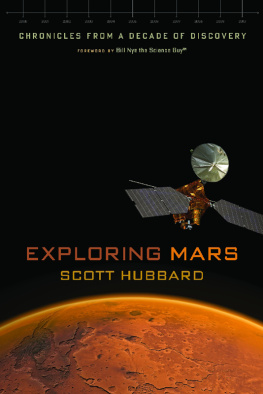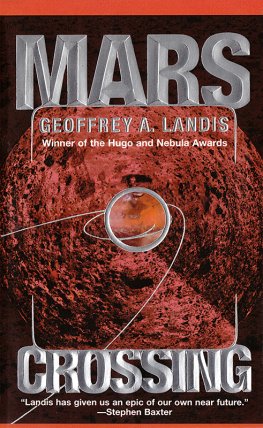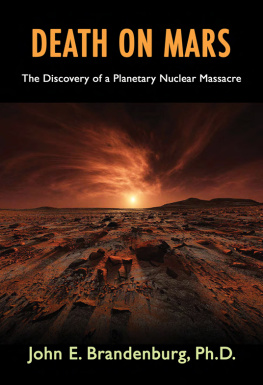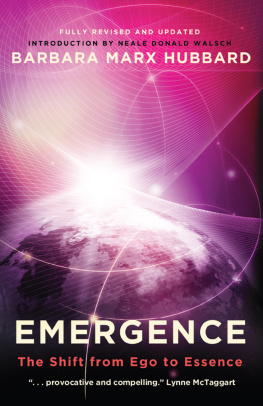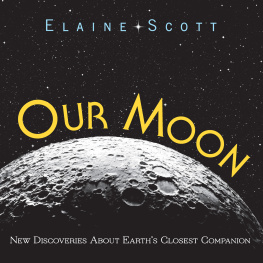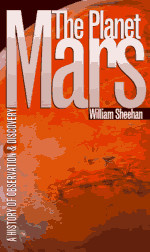Scott Hubbard - Exploring Mars: Chronicles from a Decade of Discovery
Here you can read online Scott Hubbard - Exploring Mars: Chronicles from a Decade of Discovery full text of the book (entire story) in english for free. Download pdf and epub, get meaning, cover and reviews about this ebook. year: 2011, publisher: University of Arizona Press, genre: Romance novel. Description of the work, (preface) as well as reviews are available. Best literature library LitArk.com created for fans of good reading and offers a wide selection of genres:
Romance novel
Science fiction
Adventure
Detective
Science
History
Home and family
Prose
Art
Politics
Computer
Non-fiction
Religion
Business
Children
Humor
Choose a favorite category and find really read worthwhile books. Enjoy immersion in the world of imagination, feel the emotions of the characters or learn something new for yourself, make an fascinating discovery.
- Book:Exploring Mars: Chronicles from a Decade of Discovery
- Author:
- Publisher:University of Arizona Press
- Genre:
- Year:2011
- Rating:4 / 5
- Favourites:Add to favourites
- Your mark:
- 80
- 1
- 2
- 3
- 4
- 5
Exploring Mars: Chronicles from a Decade of Discovery: summary, description and annotation
We offer to read an annotation, description, summary or preface (depends on what the author of the book "Exploring Mars: Chronicles from a Decade of Discovery" wrote himself). If you haven't found the necessary information about the book — write in the comments, we will try to find it.
Scott Hubbard: author's other books
Who wrote Exploring Mars: Chronicles from a Decade of Discovery? Find out the surname, the name of the author of the book and a list of all author's works by series.
Exploring Mars: Chronicles from a Decade of Discovery — read online for free the complete book (whole text) full work
Below is the text of the book, divided by pages. System saving the place of the last page read, allows you to conveniently read the book "Exploring Mars: Chronicles from a Decade of Discovery" online for free, without having to search again every time where you left off. Put a bookmark, and you can go to the page where you finished reading at any time.
Font size:
Interval:
Bookmark:

Exploring Mars

Chronicles from a Decade of Discovery
Scott Hubbard
Foreword by Bill Nye


2011 The Arizona Board of Regents
All rights reserved
www.uapress.arizona.edu
Library of Congress Cataloging-in-Publication Data
Hubbard, Scott, 1948
Exploring Mars : chronicles from a decade of discovery / Scott Hubbard.
p. cm.
Includes index.
ISBN 978-0-8165-2896-7 (pbk. : alk. paper)
1. Mars (Planet)Exploration. 2. Space flight to MarsHistory. I. Title.
QB643.H83 2012
523.43072'3dc23 2011036184

Manufactured in the United States of America on acid-free, archival-quality paper containing a minimum of 30% post-consumer waste and processed chlorine free.
17 16 15 14 13 12 6 5 4 3 2 1
ISBN 978-0-8165-9969-1 (ebook)
To Susan
Contents
Figures
Unless otherwise noted, all photos are provided by the author.
Plates
Color plates follow .
Foreword
Despite its common nickname, its not red so much as orange. Even then, someone has to carefully show the stargazing newcomer that the planet Mars really has a special color. Its close and bright; it has always been a special place for us. As you make your way through the history recorded in Dr. Hubbards book, please notice the names. So many Earthlings were involved in learning about our mysterious neighbor.
It has that red or reddish hue, for one thing. And so perhaps the slightly pink planet was named for the God of War. Why else would it be red, if it were not for the blood of warriors spilt in battle? This ancient theme carried to the last century in which dozens of science fiction writers imagined a planet controlled by beautiful, thoughtful, often hostile Martians, most of whom came to a bad endor came here to ensure a bad end for Earthlings.
These imagined interplanetary conflicts were fueled by waternot real so much as imagined or inferred water. In 1877, when orbital motions conspired to bring Mars slightly closer to Earth than it is most of the time, the professional Italian astronomer Schiaparelli observed what he thought might be channels on the Martian surface. With the Italian word for such geological features being canali, the gentleman astronomer Percival Lowell in the early twentieth century went to great lengths to popularize the notion that there might be water-filled canals running in a network all over Mars. Science fiction stories often featured sailboats, Martian agriculture, and cool evenings by the waters edge. Theres nothing like a worldwide drought to drive a fictitious Martian to drink. I mean to drink water from another planetusually ours. And, theres nothing like the promise of water to drive a modern spacecraft-mission manager to develop instruments that can sniff for moisture or scrape for ice in an extremely cold, remote, and desolate world.
Based on my own experience with optical eyepieces of microscopes and telescopes, Ive often wondered if people viewing Mars had overlain a reflection from the back of their own eyes onto the image in their telescopes. In a cosmic irony, they might have been interpreting the tiny pattern of blood vessels in their retinas as enormous patterns of canals on a world more than 50,000,000 kilometers away. Perhaps laughable to some of us, it is just one more problem for a scientist. How do you know when youve really discovered something new? My old professor Carl Sagan often pointed out that you have to get really close to know for sure what youre seeing. Thats why for Hubbard et al. (me inclusive), Earthbound planet gazing is not enough; you need to send spacecraft to see the Martian world up close.
With modern views of Mars provided by the designers and builders of modern telescopes, we just dont see any canals or evidence of great civil-engineering works out there. But strange as it might seem at first, the scientists and engineers of the twenty-first century are driven by the same deep quest that drove the characters of science fiction in the last century. We all sought and seek water there.
This became Dr. Scott Hubbards job, to harness the resources of a modern space agency to conceive, design, build, and launch spacecraft to look for signs of water and life, to be the Czar of Mars. Tasks difficult enough here on Earth become astonishingly difficult on a bitterly cold world hurtling through the icy blackness of space tens of millions of kilometers away.
If you think about it, it is almost incredible that we can see Mars at all, let alone aim for it and hit it with spacecraft. An object like Mars takes up a portion of sky about the same width as a thin thread held at arms length. Dont take my word for thistry it. As bright as celestial objects may seem to us on a clear, dark night, they would be absolutely invisible if space itself were not so fantastically empty. Light goes beaming right through almost all of the volume of the universe. There is nothing to stop it. There is a lot of space out in space. When light, spherically moving out from the Sun, hits Mars, a tiny fraction of it, only about 0.02 percent, bounces back to your eye. But against natures blackest background, there it is.
When youre trying to land a spacecraft near a certain mountain on Mars, this amazing emptiness becomes relevant on the scale of about one in a million. Its like hurling a baseball from a pitchers mound in Tokyo and having it land in a catchers mitt in Buenos Aires. Thats just taking into account the geometry as measured with meters or miles. When you try such a feat while taking into account all the probabilitiescombining the gambles, that is, the odds of all the things that can go wrongits not one in a million. The odds of success start to look more like one in a million in a millionmore like one in a trillion. But Dr. Hubbard and his team did itseveral times.
Ancient people were intrigued not only by what they imagined might be up there on the pale red planet but also by its remarkable, or just plain weird, motion. Mars occasionally, albeit astonishingly predictably, appears to move backwards, with retrograde motion, as seen against the other bright points of the heavens. Until Copernicus had the courage to publish his theory of planetary motion, along with remarkably accurate observations, no one could quite explain why Mars appears to move the way it does.
Mars doesnt move backwards, not at all. Instead, we Earthlings observe Mars from an inside track on a planetary raceway. Now and then, every 26 months or so, we catch up and pass our rusty neighbor on our inside lane. The Hubbard teams had to focus on this bit of orbital mechanics in every decision they made. With millions upon millions of bits of navigational data developed with more than a few million US dollars, you just cant afford to miss. As any resident of an ocean shore will tell you, the tide waits for no one. Neither does Mars. Time is money; so Scott Hubbard had to gather his gangs of scientists, engineers, and especially accountants, and get them to get along and then get going in time with the orbital rhythm of these two worlds.
Next pageFont size:
Interval:
Bookmark:
Similar books «Exploring Mars: Chronicles from a Decade of Discovery»
Look at similar books to Exploring Mars: Chronicles from a Decade of Discovery. We have selected literature similar in name and meaning in the hope of providing readers with more options to find new, interesting, not yet read works.
Discussion, reviews of the book Exploring Mars: Chronicles from a Decade of Discovery and just readers' own opinions. Leave your comments, write what you think about the work, its meaning or the main characters. Specify what exactly you liked and what you didn't like, and why you think so.

